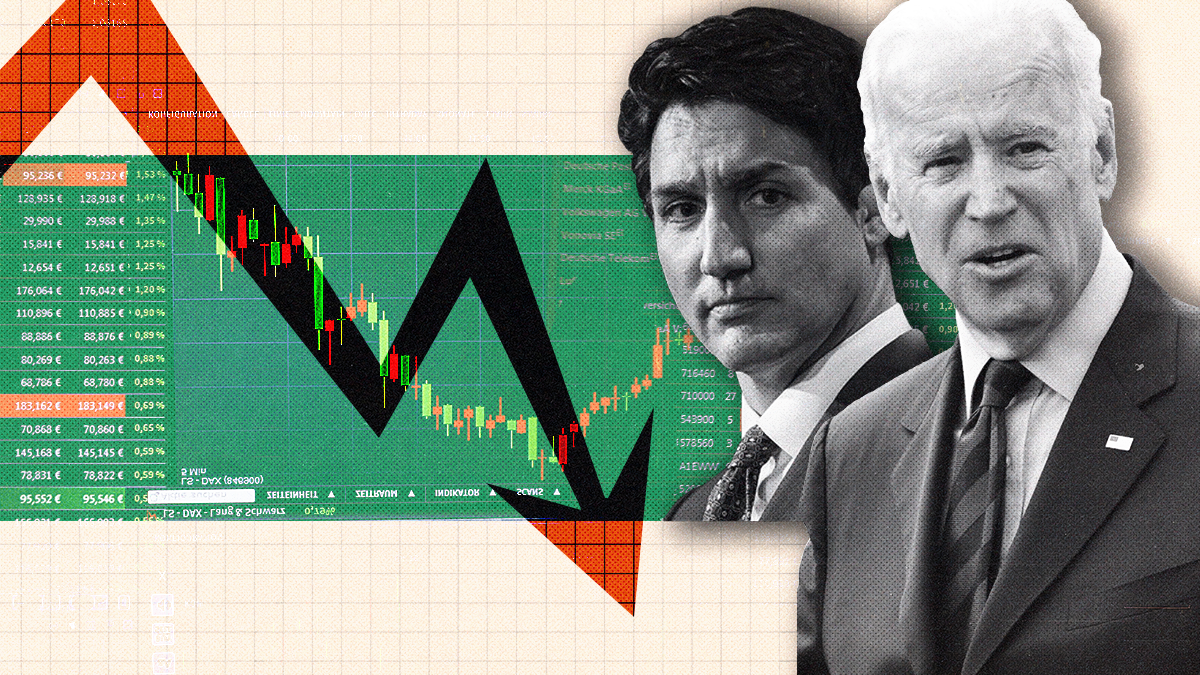Voters from the Rio Grande to the Arctic are deeply pessimistic about the economy, which means both Justin Trudeau and Joe Biden are facing an uphill battle for reelection.
The horse race polls are worrying for both men. Some 56% of Americans disapprove of the US president, while only 39% approve, and a recent NYT/Siena poll shows him trailing Donald Trump in five of six battleground states. Trudeau’s approval rating is worse — only 33% approve of him, while 61% disapprove. He has trailed the opposition Conservatives by double digits in polls for months.
But polls about the economy contain even worse news for both leaders. History shows that incumbents typically suffer when voters believe bad times are ahead – a lesson Jimmy Carter and George H.W. Bush learned the hard way. Trouble is, that is exactly what today’s voters think right now in both Canada and the US, says pollster Quito Maggi, of Mainstreet Research, a Canadian firm that polls in both countries.
“In both Canada and the US, it's about a net negative 20, people saying they're pessimistic versus optimistic” about their own personal financial prospects in the months ahead.
“What we found in the past is when we ask people about their own personal financial circumstances, they tend to be more optimistic than they are about the global economy or the economy of the country or a region. So it's pretty bad when it's that bad.”
Reality versus perception
In the United States, the actual economic indicators are mixed. Unemployment numbers are not terrible – employers added 150,000 jobs in October, but that was lower than expected – but voters are intensely focused on affordability. The latest numbers show inflation declining, but that doesn’t mean prices are going down fast enough, and there is no guarantee that voters will decide life is more affordable by late next year.
A new poll conducted for the Financial Times shows that only 14% of Americans think Biden has made them better off, which is historically a crucial test for voters come election time. In comparison, in November 2019, when Biden was campaigning for the job, 35% thought they were better off after four years of Trump.
“Biden is not getting in any way sort of credit for … the resilience of the US economy,” says Graeme Thompson, a senior analyst with Eurasia Group's global macro-geopolitics practice. “Everybody thought that if you were going to raise rates this quickly, there would be a downturn or softening growth of some variety much sooner if not a pretty significant one.”
Instead, the economy is proving to be resilient, but voters are not attributing that to Biden. Whatever else is happening in the contest — and next year’s presidential race looks less predictable than most — Biden had better hope voters are more optimistic by November.
Canadian mortgage shock
The underlying economic facts are tougher for Trudeau, whose polling is going from bad to worse. Trudeau’s position looks more precarious because a massive mortgage price shock is on the way. About 45% of Canadian mortgage holders face renewal under sharply higher rates in the next two years, the Canada Mortgage and Housing Corporation warned last week. Sales slowed down in October, and prices have softened. If the trend continues, homeowners who bought at the top of the market could end up paying more than they can afford for properties that are losing value.
Central banks in both countries have boosted rates to try to bring down inflation, but more Americans have 30-year, locked-in mortgages, so Canadians are more vulnerable to rate increases.
Still, voters in both countries are focused on their pocketbooks.
“Housing affordability is number one, food and other general affordability is number two, both in Canada and the US,” says Maggi. “It's been a long time since we've seen economic issues at the top of the ballot, and I really can't remember the last time that it was this prominent.”
People with modest incomes find it hard to focus on anything else when they are struggling to pay for shelter and sustenance, says Thompson. “Those are things that take up a majority of people's capacity to pay and are a higher percentage of household expenditures the poorer you are.”
A recent study by Eurasia Group found that in 57 inflation shocks since 1970, governments turned over in 58% of cases.
There is no reason to think Biden and Trudeau can beat the odds, says Thompson.
“The combination of slow growth on the one hand, and sticky inflation and cost of living pressures on the other is toxic for incumbents.”



















